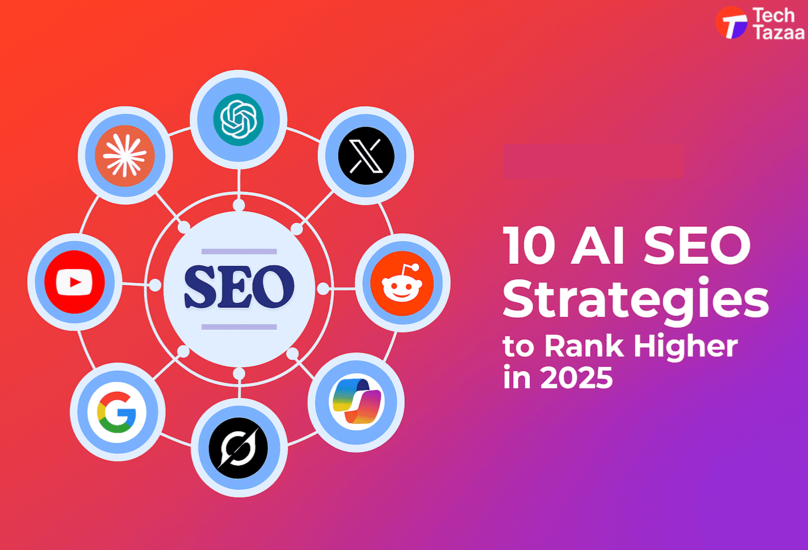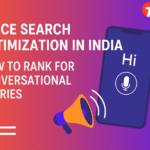The search engine optimization landscape is changing faster than ever before. SEO, as we have come to know it, focused on keywords, backlinks, and meta tags will not be enough by itself to earn a ranking. Today and in the future, the SEO world will be shaped by AI. As AI-powered search engines–especially Google’s Search Generative Experience (SGE) discreetly come to life, understanding what AI considers when ranking is very important for any marketer, business, or content creator wanting to rank in 2025.
In this guide, we will explore 10 AI SEO strategies to optimize your content for AI search results, own the SERP, and future-proof your SEO.
What Is AI SEO?
AI SEO refers to the implementation of artificial intelligence to plan, develop, and optimize content for search engines. Unlike traditional SEO which relies upon keywords and backlinks, AI SEO considers semantic relevance, user intent, and quality of content. AI SEO is a reflection of how AI algorithms evaluate and reason about information, which affects search engine results, featured snippets, and AI generated summaries.
The emergence of AI-searching technologies such as SGE is changing the focus from just ranking content in a search to whether the content can be consumed and understood and be featured or summarized by AI systems.
Key aspects of AI SEO include:
- Understanding user intent beyond keywords.
- Structuring content for AI comprehension, including headings, paragraphs, and schema markup.
- Optimizing for rich results and AI-generated answers.
In short, AI SEO is about future-proofing your content so it remains relevant, visible, and competitive in the age of AI-driven search.
Understanding AI Search Ranking & SGE Optimization
AI search ranking refers to how AI-powered algorithms determine the relevance and authority of content in response to search queries. Google’s Search Generative Experience (SGE) is a clear example. SGE goes beyond the traditional search results by providing AI-generated summaries and conversational answers, which can significantly influence traffic and visibility.
SGE optimization involves designing your content to:
- Rank well on traditional SERPs.
- Appear in AI-generated answers.
- Match the intent and context that AI algorithms prioritize.
To optimize for SGE, you need to focus on structured content, clear and concise answers, and authoritative references. It’s no longer enough to sprinkle keywords throughout your text; your content must be semantically rich and highly relevant to the questions your audience is asking.
10 AI SEO Strategies to Rank Higher in 2025
1. Optimize Content for Conversational Search Queries
More frequently, users are searching using complete sentences in conversational language (through voice search, for example, and AI assistants). AI-enabled search engines detect context and intent, making it critical to optimize for conversational queries.
How to optimize:
- Use FAQs, headings, and subheadings to answer common questions.
- Integrate long-tail keywords naturally, such as “how to improve AI search ranking” or “SGE optimization tips for 2025.”
- Write content as if you’re talking to a user, not just feeding a search engine.
When optimized for conversational queries, the content is more likely to serve as a source for AI-generated summaries, as well as surfacing within voice search results, driving traffic and engagement.
2. Implement Structured Data & Schema Markup
Structured data is an important aspect of AI understanding. By providing contextual information about the content’s meaning and purpose, structured data helps AI algorithms understand the meaning of the content, content meaning, and intent.
Key strategies:
- Use FAQ schema to mark up questions and answers.
- Implement HowTo schema for instructional content.
- Include Product, Review, and Article schemas for e-commerce or informational content.
Structured data raises the probability of being featured in rich snippets, Knowledge Panels, and AI assisted answers, which are becoming more important for AI SEO.
3. Create Authoritative, EEAT-Driven Content
Google’s AI models place a strong emphasis on the EEAT principle when ranking websites; this stands for Experience, Expertise, Authoritativeness and Trustworthiness. Content that exhibits these characteristics typically ranks higher in either generative AI or traditional search results.
How to build EEAT:
- Showcase author credentials and relevant experience.
- Cite authoritative sources, including academic papers, industry reports, or well-known publications.
- Use data, case studies, and examples to strengthen credibility.
In fact, authoritative content contributes to higher rankings and builds trust with your audience, and trust is a fundamental objective of AI-driven search engines.
4. Use AI Tools to Analyze and Optimize Content
AI-powered SEO tools can provide deep insights that traditional methods cannot. They help identify content gaps, topic clusters, and keyword opportunities aligned with AI search patterns.
Recommended tools:
- Surfer SEO – Content optimization based on SERP analysis.
- Clearscope – Semantic keyword research for content relevance.
- Frase – AI-assisted content briefs and question analysis.
By leveraging AI tools, you can fine-tune your content for higher relevance, engagement, and AI search ranking, ensuring it meets both user needs and algorithm requirements.
5. Target Featured Snippets & AI Overviews
Featured snippets are often the first source of content for AI-generated answers. Optimizing for snippets can significantly increase your AI search visibility.
Strategies to win snippets:
- Use direct answers, lists, tables, and step-by-step instructions.
- Include primary keywords in headings and answers.
- Format content for quick scanning, which helps AI identify relevant portions.
Getting featured in snippets not only boosts visibility but also establishes your site as an authoritative source.
6. Optimize for Multimodal & Voice Search
AI search is increasingly multimodal, incorporating text, images, and voice. Optimizing for these formats is critical in 2025.
How to optimize:
- Use descriptive alt text for images and captions for videos.
- Ensure your content reads naturally aloud for voice search queries.
- Implement structured data for visual content to help AI understand context.
This approach helps your content appear across diverse AI search formats, increasing reach and engagement.
7. Focus on Topical Authority & Content Clusters
AI-driven search engines value in-depth coverage of topics. Creating content clusters is a powerful way to establish topical authority.
How to build clusters:
- Identify a core topic, such as AI SEO.
- Create multiple supporting articles covering subtopics like SGE optimization, voice search, and structured data.
- Use internal linking to connect all cluster articles, signaling expertise to AI algorithms.
Content clusters ensure your website is comprehensively covering topics, which is increasingly rewarded by AI search engines.
8. Improve Page Experience & Core Web Vitals
Even in AI SEO, user experience remains a critical ranking factor. Search engines want content that users can access quickly, interact with easily, and enjoy consuming.
Tips to optimize:
- Ensure fast loading speed and mobile responsiveness.
- Optimize Core Web Vitals: Largest Contentful Paint, First Input Delay, and Cumulative Layout Shift.
- Minimize intrusive pop-ups or confusing navigation.
A great page experience reduces bounce rates and signals relevance and trustworthiness to AI algorithms.
9. Leverage Real-Time Content Updates with AI
AI algorithms prioritize fresh and relevant content. Updating your existing content can maintain or improve rankings.
How to do it:
- Refresh articles with new statistics, examples, or trends.
- Use AI tools to identify emerging queries in your niche.
- Republish or update content periodically to signal freshness.
This keeps your content aligned with evolving AI search ranking factors and maintains visibility over time.
10. Build AI-Optimized Link Strategies
Links remain a powerful ranking factor, but AI SEO emphasizes relevance and context over sheer quantity.
Linking strategies:
- Internal links strengthen topic clusters and improve crawlability.
- External links should point to high-authority sources to enhance credibility.
- Avoid spammy or irrelevant backlinks; AI algorithms can detect and penalize low-quality links.
Balanced linking strategies increase trustworthiness and topical authority, improving your chances in AI search results.
Internal & External Linking Strategy
Internal Linking:
- Link related guides and articles like “Voice Search SEO Guide 2025” or “Featured Snippet Optimization.”
- Helps AI understand your website’s structure and topical focus.
External Linking:
- Link to authoritative sources such as Google Developers, SEO research studies, and industry reports.
- Builds trust and authority, which is essential for both traditional and AI SEO.
FAQs: AI SEO & SGE Optimization
1: What is AI SEO and why is it important in 2025?
AI SEO aligns your content with AI-driven algorithms, ensuring higher visibility in modern search results.
2: How does Google SGE affect SEO rankings?
SGE provides AI-generated summaries, so content must be clear, structured, and authoritative to be featured.
3: Can AI tools improve SEO performance?
Yes. AI tools help identify keywords, content gaps, and optimization opportunities, improving both ranking and relevance.
4: What’s the difference between AI search ranking and traditional SEO?
Traditional SEO focuses on keywords and backlinks, while AI search ranking emphasizes intent, context, and semantic relevance.
5: How can small businesses optimize for AI search?
Create high-quality, structured content, target long-tail queries, and build authoritative internal and external links.
Conclusion: Future-Proof Your SEO with AI
In 2025, the SEO landscape will consist of AI SEO, SGE optimization, and AI search ranking strategies. Wherever you apply one of these 10 actionable strategies, your content will be visible, have authority, and satisfy search demands as they change and evolve.
By focusing on conversational content, structured data, EEAT principles, and real-time updates, you can take over the results in the AI-driven future of search and future-proof your website’s performance.
Don’t wait—start implementing these AI SEO tactics today. Subscribe to our YouTube Channel for the latest updates, download our AI SEO checklist, and take the first step toward mastering AI search ranking in 2025.


